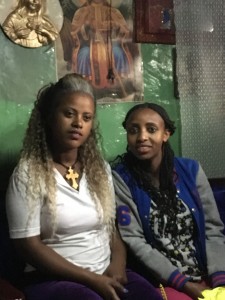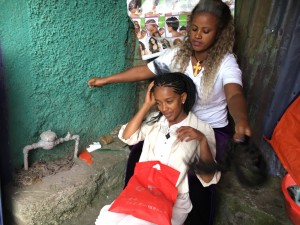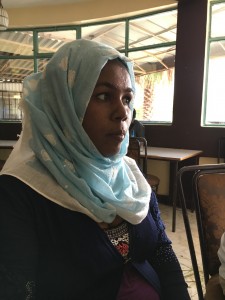[Stories of Origin] The ban is a blessing... For the traffickers in Ethiopia
In the first of a four-part series, Stories of Origin studies the environment from which Ethiopians are forced to migrate, while disregarding bans and words of caution.
About 170,000 Ethiopians were deported from Saudi Arabia between November 2013 and March 2014. Four years later, Ethiopia is yet to fully reintegrate and rehabilitate these returnees, and now has to grapple with the deportation of another 100,000 workers.
Since the first en masse deportation, neither Ethiopia nor Saudi Arabia has done much to improve the status of this highly marginalised group. The stories only get more desperate.
In 2014, Ethiopia dovetailed Saudi’s deportation with a ban of its own. Temporary at the time of the announcement, the blanket ban on Ethiopian women migrating for domestic work is still in place. And as bans go, it’s a complete failure that only served to make the situation of migrants more precarious.
Every returnee and potential migrant shrugs at the idea of the ban doing any good.
“Ban? The only thing that happens is that the price goes up. Doesn’t stop anyone, and the black market becomes profitable,” says Fatima Hassan, who has two daughters working in the GCC.
Migrant-Rights.org spoke to potential migrants, returnees, and their families. Most of those we interviewed found a passage to the Gulf during the ban.
The most disheartening truth of the pre- and post-ban era is that little has changed to protect female migrant workers. In Saudi Arabia and the rest of the GCC, new laws and regulations notwithstanding, attitudes towards domestic workers continue to be indifferent at best and cruel at worst.
There’s only the occasional societal outrage on the fringes of gruesome incidents like that of Adesech Sadik or Kasturi.
Sadik was filmed by her employer in Kuwait, as she was pleading for her life, hanging from a seventh-floor balcony. Kasturi’s arm was chopped off by her Saudi employer when she attempted to escape the abusive household.
...long-term plans are encompassed in short-term projects, often driven by donor-agendas, susceptible to change alongside donor priorities...
There is no information on what justice has been served by the two countries, and what punishment the employers received (Sadik's employer was arrested, but no updates are available on the status of the case). These are just two of the thousands of cases of abuse that origin country embassies receive in the GCC states. Repatriating the workers is seen as resolution, while the employers and state get away scot-free.

Saba (L) and Salam are returnees who are considering re-migrating as options are limited in Ethiopia

Saba runs a braiding business from the ledge outside of her home. She wants to set up a proper salon
Lessons not learnt
For Ethiopia, which has the longest legacy of migration to the Gulf from the Horn of Africa, the experiences have not really served as a learning opportunity. It has grappled with internal conflict, drought and unemployment. With so little opportunity at home, prohibiting its most marginalised citizens from going abroad has only assured a steady stream of business for traffickers and smugglers.
Addis Ababa is the headquarters for the African Union, and home for regional offices of the biggest developmental, UN, and donor agencies. Which means long-term plans are encompassed in short-term projects, often driven by donor-agendas, susceptible to change alongside donor priorities, regardless of needs on the ground.
There doesn’t seem to be a cohesive plan for the country as a whole, experts we speak to point out.
Citizens have no choice but to look outward. There are three levels of migration, three composite regions that an average low-skilled potential migrant recognises and hopes to land in. Getting out of their village to Addis Ababa; getting out of Ethiopia to other African countries, and getting out of Africa to the Middle East. Every path out of their home and into these regions is a risky one. Crossing through war zones in Yemen and conflicts in Somaliland at the mercy of traffickers and smugglers, they then land in countries that don’t have the laws or will to protect them.
“There are no job opportunities, no technical or financial resources to start own business, no rehabilitation and reintegration process. So returnees always strive to go back. With the ban, they are now using brokers instead of registered agents. They all want to re-migrate,” says Mebratu Gebeyehu, a consultant who works on migration policies.
Like Salam and Saba who are neighbours and friends. They have both trained as hairdressers and take customers on the mud ledge outside their home, in Addis Ketama, an impoverished sub-city in the capital. If their current situation doesn’t change, they would like to migrate again.
Saba has worked in Saudi for three years and then a year in Sharjah. She wants to move to Dubai, where she believes her life would be much better.
Salam is not so sure. “If things are smooth here, I will stay back. I worked for nearly three years in Abu Dhabi. I had to come back because of poor health.”
Though she was paid her 600 dirhams salary on time, the employer deducted two months salary for costs of recruitment. “They were ok, but weekends, Thursday to Saturday, they would lock up the house and we didn’t even have access to kitchen or food. There was a Filipino maid with me. We had to get food from outside.”
A 19-hour work day, seven days a week, for less than 40 cents an hour.
Saba was not so lucky. “I was there on a four-year contract. The family I worked for in Riyadh were poor themselves. So I wasn’t paid regularly. In fact, for the last six months, I was not paid at all. I preferred work in Emirates, at least there you have some freedom.”
Saba feels if she and Salam were to set up a salon they would earn as much as they would in the Gulf. “But not if we work for someone here. That won’t pay us much at all.”
Their stint abroad has not ensured even the slightest of financial stability for the women.
According to a survey of returnees in 2014, on average, every female or male migrant had 3.8 dependents on remittances. Less than 31 percent of respondents said their remittance were saved back home.
As Gebeyehu points out, “A girl who works there sends money to her parents or siblings or husband. They assume the family will save money for them. She comes back and realises her assumption was wrong. There’s no financial planning.”
‘Everybody lives his own fate’
Laila Wasihun, knows exactly what that feels like. She takes a long sip of her soda. She has spent the morning walking with us through the streets of Kombolcha where she works as a community mobiliser, listening to people’s aspirations and fears, their longing and desperation for a better life. She was more than an empathetic listener.
She was them four years ago, on the brink of moving to Taif, Saudi Arabia; she was that girl about whom a parent fretted for three years and four months. Now, at 26, she is this person who tries to gently and firmly steer families away from making ill-informed choices.
“People do ask for advice. And there’s also a huge resistance from those who have never been abroad when I offer mine.”
Dr Daniel Keftasse quotes an oft-repeated saying in Oromo and Amharic. ‘Everybody lives his own chance/fate.’
You can line up any amount of evidence against going abroad, but the migrant will take his ‘chaara’ or ‘ool’, he says. (Both mean chance in Oromo and Amharic)
“What about the probability of success? No one listens,” says Keftasse, who works in the Arsi highlands (about four hours from Addis). His organisation, Harmee Education for Development Association (HEFDA), tries to keep girls in school long enough to either not migrate at all, or migrate with knowledge and skills.
Laila shares her story from taking a fateful chance to now helping others make an educated choice.
“In Taif, I worked for a young couple who had three children. The first year I worked only at their home. Then I was asked to work at madam’s mother’s house nearby, as her Indonesian maid had left. I would be up by 5.30 a.m. and would not be able to get to bed until well past midnight.”
Living on low expectations
The expectations of a good work environment are so low, Laila maintains they treated her well, like family. “They even took me with them to Dubai on a holiday. After the first three months they gave me a phone, bought me air time, I called home every week,” she reminisces fondly.
But the workload was too much. She tried negotiating a pay raise and was promised one after four years. “But I could not hang on any longer. I could not take the load. For six months they resisted my plea to go back home. Then they gave in. Sent me back with gifts.”
For 800 riyals a month – which was paid on time and regularly, she reminds us gratefully – she worked two homes, short on sleep and rest.
A 19-hour work day, seven days a week, for less than 40 cents an hour.
Laila would have liked to continue working, realising a few dreams of her own. “My first aim was to help my parents, brothers and sister. Now my brother has his own garage… my family is doing well. But I haven’t been able to do much for myself.”
Laila is also concerned that thousands of her sisters are migrating with inadequate or wrong information, unprepared to face challenges that are likely to arise. Because there’s no proper information reaching them, they go for advice from peers that seem easy but is not. “Some encourage workers to run away so they would earn more. They shouldn’t. Their whole life can be ruined by on an ill-thought decision.”
The pressure from parents is far higher than from the girls themselves.”
Chimera of success
Gebeyehu says that in the past there were some who had changed their lifestyles because of money from Jeddah. They still serve as an example, even if you don’t see that many success stories now.
“For the community, it’s a way out of poverty. There’s a positive perception to migration, despite the reporting to the contrary. Unless this changes there won’t be any participation in law enforcement.”
The perception is so deep-rooted, it even creeps into negotiations in arranged marriages. “There’s been a practice to send wife or daughter to Jeddah. ‘Will you send your daughter to Jeddah?’ is what they ask when a marriage is being fixed,” says Gebeyehu.
Keftasse reiterates this. “People don’t understand how migrants live there. They only recognise that they send money. The pressure from parents is far higher than from the girls themselves. By the time they are 17 or 18 they are groomed to go abroad. The ones who come back are ashamed of any humiliation they might have faced and don’t feel comfortable speaking about experiences there. So they lie or hide the truth.”
His organisation identified a high correlation between school dropouts and migration when they worked actively on migration between 2013 and 2015. But these projects are short term, as donor's interests change too.
“The centre of our work is education, to keep them in school, give them hope. To help them see possibilities in the country. We are also challenged. When we have educated people who can’t find a job. If they do want to migrate, we ask them to go with a skill. But they go to the Arab world only as domestic workers.”
Only two or three out of ten girls find a job after school and they feel there’s no hope and future in this country, he says.
Migration and more so illegal migration is a big business.
According to Keftasse, “Everyone makes money, governments, brokers… and it’s not about remittances alone, it’s being relieved from the burden of unemployment for the government.”
Next: “I want to escape”





